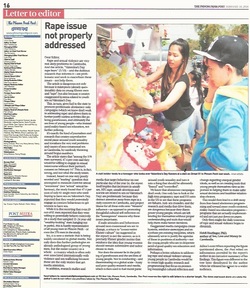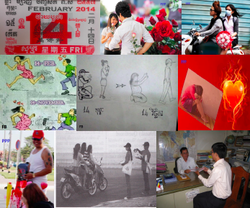
February 18, 2014
Phnom Penh Post
Dear Editor,
Rape and sexual violence are very real daily problems in Cambodia. And the article,“Valentine’s Day rape fears” – and the dubious research that informs it – are problematic and work to exacerbate these issues – not help them.
The article is dangerous not only because it misreports (already questionable) data on young Khmer men and “rape”, but also because it creates exaggerated hysteria related to youth sex on Valentine’s Day.
This, in turn, gives fuel to the state to promote problematic abstinence-only campaigns (which we know don’t work in addressing rape) and allows them to further justify useless activities like policing guesthouses, and ultimately the sex lives of young people – who instead need reality-based sex education, not further policing.
It’s exactly the kind of journalism and research that creates unproductive moral panic around youth sexuality and trivializes the very real problems and causes of non-consensual sex in Cambodia, by carelessly throwing around bogus numbers.
The article states that “among the 376 men surveyed, 47.4 per cent said they would be willing to engage in sexual intercourse without their partner’s consent on February 14”. This is, in fact, wrong, and not what the study states.
Instead, based on one very poorly worded and “leading” question that attempted to measure coercive sexual “intentions” (not “actual” sexual behaviour), the study found that 47.4 per cent of only 61 single men who were hoping to have sex on Valentine’s Day, reported that they would potentially engage in coercive behaviours to get women to have sex.
While it is disconcerting that even 29 out of 61 men reported that they were willing to potentially behave coercively (in a study that sampled 15-24 year-old “wealthy-looking” men hanging out in parks), this is hardly representative of all young men in Phnom Penh – or even the 376 men in the study.
Yet, it is now a statistic that is being widely circulated in global media. Not only does this further pathologise an already-pathologised group of young men, but the entire country as a whole – a country which is often only ever associated internationally with violence and sex trafficking because these are the only stories that get media attention.
In addition, research studies and media that target behaviour on one particular day of the year (ie, the report itself implies that increases in unsafe sex, HIV, rape, unsafe abortions and suicide are related to sex on Valentine’s Day) are problematic because they distract attention away from rape as a daily concern in Cambodia, and project blame for all these evils onto “Western” influence – as opposed to promoting thoughtful cultural self-reflection on the “homegrown” reasons why these issues perpetuate.
If male attitudes and behaviours around non-consensual sex are to change, a return to “conservative Khmer culture” (as suggested in the report) is not the answer, as is it precisely Khmer gender norms that reinforce the idea that young women should remain submissive and subordinate to men.
Nor does the answer lie in the policing of guesthouses and the sex lives of young people. Nor in conducting – and disseminating on a global scale – hasty and poor-quality research and media, which is then used to fuel moral panic around youth sexuality and turn it into a thing that should be ultimately “feared” and “controlled”.
We know that abstinence campaigns don’t work. One only has to look at the high teen pregnancy, rape and STI rates in the US to see that these programs are failures. Anti-sex crusades, and the research and media that drive them, are dangerous because they disempower young people, whom are left fending for themselves without proper understanding and tools that would help them make better decisions.
Exaggerated media campaigns create hysteria, reinforce stereotypes and exacerbate pre-existing inequities, which ultimately serve to justify the agendas of those in positions of authority – not the young people who are in desperate need of good quality sex education and information.
Perhaps a better solution to addressing rape and sexual violence among young people in Cambodia would be to create high-quality research and programming that focus on promoting meaningful cultural reflection and change regarding unequal gender ideals, as well as on creating tools that young people themselves view as important in helping them to make safer sexual decisions and healthier relationship choices.
This would then lead to a shift away from fear-based abstinence programming and toward more youth-centered, reality-based sex education programs – programs that are actually implemented and not just put down on paper.
Only then might the daily concerns of rape and sexual violence begin to diminish.
Heidi Hoefinger, PhD,
author of Sex, Love and Money in Cambodia
Editor’s note: When reporting the figure questioned above, the Post relied on information provided by the report’s author in an executive summary of his findings. This figure was different from the one later distributed by the author when he released his report to a wider audience.


 RSS Feed
RSS Feed